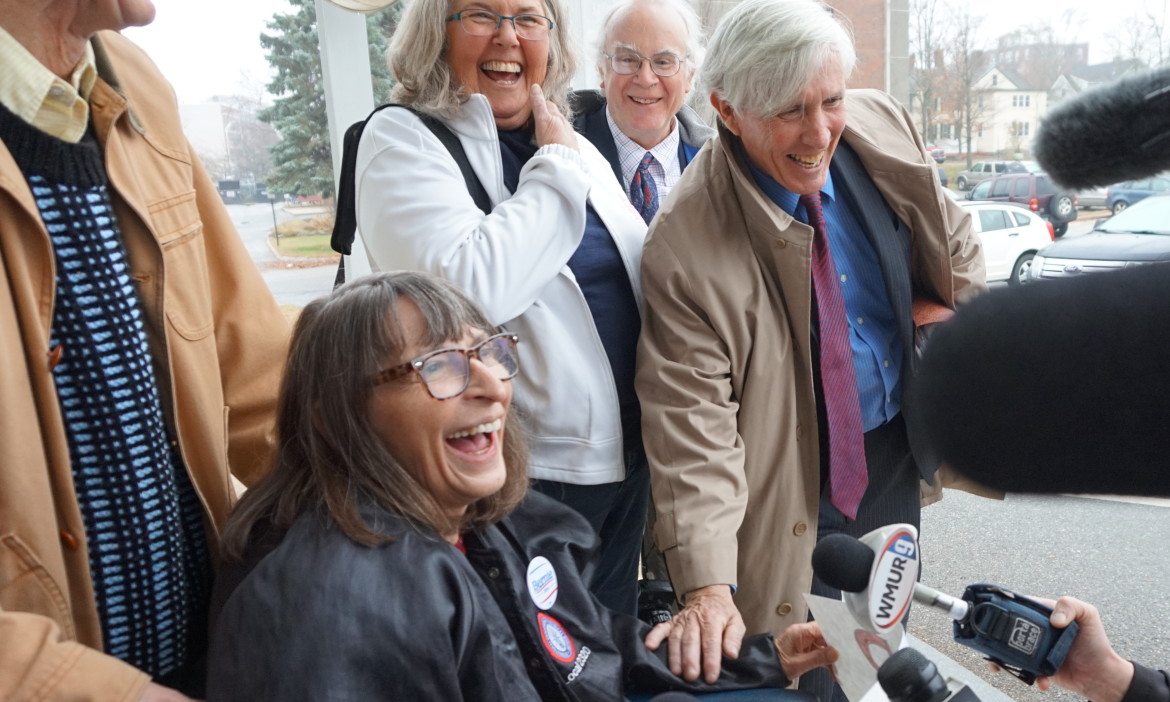Judge Richard B. McNamara today ordered the state to issue a medical marijuana registration card to dying labor activist Linda Horan “without undue delay” so she can buy it legally in Maine.
“The Court believes the Legislature intended to relieve the suffering of cancer patients such as (Horan) when it enacted RSA chapter 126-X,” in July of 2013, McNamara wrote. His ruling was released Tuesday in Merrimack County Superior Court in Concord.
Now that New Hampshire has designated legal medical marijuana dispensaries, the “Legislature’s intent can be effectuated by processing (Horan’s) application for a registry identification card, as the statute requires,” McNamara wrote.
Horan had to catch her breath before she could speak about McNamara’s ruling. She was close to tears.
“I’m over the moon,” Horan said. “It is a great day.”
Horan, 64, thanked everyone who fought for her, including her lawyer, Paul Twomey, who represented her for free.
“I’m grateful to the judge for his ruling and his humanity,” Horan said. “I’m grateful to Commissioner (Nicholas) Toumpas who did everything to help us.”
Horan has been active with the AFL-CIO and IBEW Local 2320 for many years.
Judge Richard B. McNamara’s ruling:
https://goo.gl/8uHMMV
State Rep. Renny Cushing, D-Hampton, said: “The Court got it Right.”
Cushing has advocated for Horan.
Twomey was also grateful to McNamara, the Department of Health and Human Services and the Marijuana Policy Project.
“Linda is a hero,” Twomey said. “Facing death, she has chosen to fight for the rights of all the critically ill patients in New Hampshire, who should not have to fear arrest because they are sick.”
Assistant Attorney General Frank Fredericks, who represented DHHS, did not immediately return calls.
Fredericks had argued qualifying patients had to wait until the legal dispensaries are operational in New Hampshire – estimated to be in the first or second quarter of 2016 — before the state could issue ID cards to patients.
Fredericks had also questioned whether Horan could legally obtain medical marijuana in Maine under Maine’s law regarding what it regards as qualifying visitors.
McNamara noted that Horan is suffering from terminal stage four lung cancer, which has spread to her brain and lymph nodes.
“Her prognosis is death within months, accompanied by painful side effects,” McNamara said in granting Horan’s petition for preliminary injunction.
It is unclear whether the ruling will allow other New Hampshire patients who qualify for medical marijuana to obtain it before the dispensaries are operational.
Twomey said the Marijuana Policy Project provided assistance that made it possible for Horan to receive the medical treatment she needs.
“Quite simply, we would not have been able to bring this lawsuit without their help,” Twomey said.
Matt Simon, New England political director of the Marijuana Policy Project, said he will wait and see what the Attorney General’s Office decides relative to other qualifying patients.
“But as long as they qualify and agree to abide by Maine laws and rules, it’s hard to imagine what their argument would be against issuing ID cards to patients who qualify,” Simon said.





